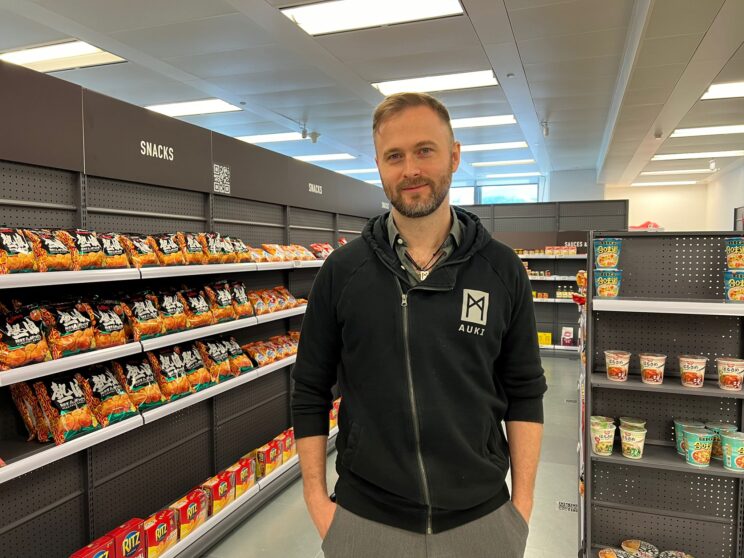Auki Labs: Leading Hong Kong to Itself

Hong Kong has long been known as a city defined by its harbour; but for those who live, work and play here, it is far more prevalently defined by verticality. With a built environment shaped by hilly terrain and the imperative to build up rather than out, three-dimensional thinking comes naturally to Hong Kong’s denizens, informing even their most mundane activities and intentions.
For Nils Pihl, Founder and CEO of Auki Labs, it is precisely this quality that makes Hong Kong a contender as not just a future ‘smart city’, but perhaps the world’s smartest city. The key to it all, he believes, is spatial computing, giving mobile devices the ability to fix their precise location in a 3D environment, their relative position to other devices, and to share each other’s views of AR elements overlaid on the environment. According to Pihl, “If this is the technology and this is the decade and this is the place… then maybe we are the people.”
The accidental entrepreneur
‘We’ is Auki Labs, the Kowloon Bay-headquartered startup Pihl founded three years ago. In many ways, it is the culmination of a fascination with technology and behaviour which began in his teenage years in his native Sweden. “My parents were software entrepreneurs, so I had a computer of my own when I was 4-5 years old. I was doing competitive gaming when I was around 14, and through playing a 3D game called ‘Tom Clancy’s Ghost Recon’, I developed a fascination with behaviour and behavioural prediction,” he recalls.
Pihl soon parlayed his ‘teenage anthropology’ into successfully coaching ‘Ghost Recon’ teams, and after stints in the army and university, went on to work at a tech company. Later, he joined with an engineer to found a behavioural consultancy. After experiencing some success, they moved to Beijing and founded yet another company to develop products based on behavioural analytics. “We ran that for four years and it did very well… until it did very poorly.” Pihl laughs.
A job offer brought him to Hong Kong in 2018, and it wasn’t long before Auki Labs was born – “almost by accident”, he says.
“I was passionate about ‘Warhammer’, and while making AR for the tabletop game, I realised that it could not do positioning. That is, multiple players could not see the same AR layer because the game could not do positioning.”
Making the spatial case
The breakthrough that followed – after a few more years’ hard work from Pihl and his team – is perhaps best explained by contrasting it with GPS, the current positioning and navigation standard. Being a line-of-sight system, its shortcomings become acutely apparent in vertical cities such as Hong Kong, which has more than 4,000 buildings taller than 100 metres. And while GPS might find your position on a 2D map, finding it in 3D – such as inside a five-storey shopping mall – is out of the question.
The possibilities growing from spatial computing are exciting and limitless. Pihl envisions Hong Kongers using their mobiles – and in due course, AR glasses – not only for step-by-step navigation through its maze of streets, MTR stations and multistorey buildings, but to reveal the world within their world, with AR pointing out interesting shops, restaurants, individual items, and even their proximity to friends.
“I feel convinced that Hong Kong is going to be the first city where a sizeable percentage of the population will wear AR glasses. Why? Because here, it solves a real problem,” he says. “The need for 3D navigation is much greater in a city like Hong Kong, and perhaps because of that, Hong Kong has a lot of spatial computing talent.”
A city in readiness
Investors seemingly agree with Pihl’s vision, having thus far funded Auki Labs to the tune of US$19 million. He credits InvestHK as introducing them to useful people and making some vital industry connections. “We’ve made a lot of friends and new partners, and I didn’t expect a government agency to do this,” he remarks.
Pihl is equally impressed by the Hong Kong Government’s own efforts to facilitate a ‘smart city’, which dovetail into his own. “One of the really special things about Hong Kong is that it has a government-led digital twin of the city – an open-source data library of geospatial models of the city. We can’t wait to start working with that data to bring some of these experiences to the cityscape,” he says.
“The government understands that spatial data is the key to the smart city. Machines have to understand how they can collaborate, coordinate, etc. Hong Kong gets it.”
Upward and outward
For the more immediate future, Auki Labs is in the process of rolling out some smaller-scale – though no less impactful – spinoffs of its technology. The company has already used a combination of spatial computing and QR codes to create an effective indoor navigation system for the most recent Hong Kong FinTech Week. Recently, they also piloted a route optimisation system that promises greater speed and accuracy for online retail order-taking as well as applications for stock management and even retail staff training.
Ironically for spatial computing specialists, space has become a concern for Auki Labs – a problem they solved by opening a new, larger office. “We needed a bigger one, not only because we were running out of seats, but because we also wanted to collaborate more closely with a couple of other Hong Kong companies that are in adjacent fields to us,” Pihl explains.
“If you’re a startup building IoT or robotics or smart city technology, we would love to invite you to come work with us.”


